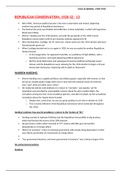Crisis of identity, 1920-1945
REPUBLICAN CONSERVATISM, 1920-32 - 13
After WW1, American politics became a lot more conservative and inward, beginning
another long period of Republican dominance
The Democratic party was divided and ineffective, at least nationally, in which all Progressive
ideals were falling
Warren Harding won the 1920 election, and with the prosperity of the 1920’s boom,
Republican conservatism (with its pro-business policies) appeared to fit
After Harding died, Coolidge, his VP, took over, whom easily won the 1924 election (previous
Massachusetts governor)
When Coolidge decided not to run again in 1928, he was succeeded by another Republican,
Herbert Hoover
o In his inauguration, he appeared invincible, as a politician of high abilities, with a
booming economy, and weak appearing political opponents
o But the Great Depression and subsequent economic/political earthquake swept
Hoover and the Republicans away, allowing for the 1932 election to begin a 20 year
Democratic dominance, beginning with Franklin D. Roosevelt!
WARREN HARDING
Warren Harding was a capable politician and widely popular, especially with women, in that
he had an amiable public image which was in tune with the national mood; his interests
were “golf, drink and other men’s wives”
His moderate policies and emphasis on a return to ‘normalcy’ was popular, yet his
reputation was tarnished by unescapable rumours about his extra-marital affairs, the
corruption among his inner circle of political partners, and after his death, by the sensational
revelations about the Teapot Dome Scandal
o Despite this, at the time, he was at a great position to win the re-election in 1924
o This is clearly reflective of the Republican dominance which continued throughout
the 1920s
Harding’s policies- how was his presidency a return to the ‘System of ’96’?
Harding seemed to replicate McKinley and the Republican favourability to big business,
which had formed the victory of the 1896 election
He perceived a nation which returned to 19 th century with little gov intervention
domestically or in foreign affairs
‘Return to normalcy’- return to minimal government with people being dependant on their
own efforts and limited US involvement in foreign affairs
“less government business, and more government in business” was a famous slogan of his
His achievements/policies
Positives





